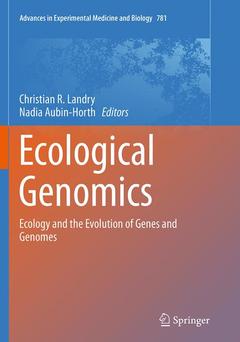Description
Ecological Genomics, Softcover reprint of the original 1st ed. 2014
Ecology and the Evolution of Genes and Genomes
Advances in Experimental Medicine and Biology Series, Vol. 781
Coordinators: Landry Christian R., Aubin-Horth Nadia
Language: English
Subjects for Ecological Genomics:
Publication date: 08-2016
Support: Print on demand
Publication date: 12-2013
359 p. · 17.8x25.4 cm · Hardback
Description
/li>Contents
/li>Comment
/li>
Researchers in the field of ecological genomics aim to determine how a genome or a population of genomes interacts with its environment across ecological and evolutionary timescales. Ecological genomics is trans-disciplinary by nature. Ecologists have turned to genomics to be able to elucidate the mechanistic bases of the biodiversity their research tries to understand. Genomicists have turned to ecology in order to better explain the functional cellular and molecular variation they observed in their model organisms.
We provide an advanced-level book that covers this recent research and proposes future development for this field. A synthesis of the field of ecological genomics emerges from this volume. Ecological Genomics covers a wide array of organisms (microbes, plants and animals) in order to be able to identify central concepts that motivate and derive from recent investigations in different branches of the tree of life.
Ecological Genomics covers 3 fields of research that have most benefited from the recent technological and conceptual developments in the field of ecological genomics: the study of life-history evolution and its impact of genome architectures; the study of the genomic bases of phenotypic plasticity and the study of the genomic bases of adaptation and speciation.
1. Recent advances in ecological genomics: from phenotypic plasticity to convergent and adaptive evolution and speciation.- 2. Trait transitions in explicit ecological and genomic contexts: plant mating systems as case studies.- 3. Revisiting Mortimer’s genome renewal hypothesis: heterozygosity, homothallism, and the potential for adaptation in yeast.- 4. Ecological genomics of adaptation and speciation in Fungi.- 5. Integrating phenotypic plasticity within an ecological genomics framework: recent insights from the genomics, evolution, ecology, and fitness of plasticity.- 6. Eco-evo-devo: the time has come.- 7. Evolutionary and ecological genomics of developmental plasticity: novel approaches and first insights from the study of horned beetles.- 8. Neurogenomics of behavioral plasticity.- 9. Ecological genomics of host behavior manipulation by parasites.- 10. Ecological epigenetics.- 11. The reproducibility of adaptation in the light of experimental evolution with whole genome sequencing.- 12. Ecological Genomics of Host Shifts in Drosophila mojavensis.- 13. The genomics of an adaptive radiation—insights across the Heliconius speciation continuum.- 14. Merging ecology and genomics to dissect diversity in wild tomatoes and their relatives.- 15. Integrated genomics approaches in evolutionary and ecological endocrinology.- 16. Evolutionary genomics of environmental pollution.- 17. Signatures of natural selection and ecological differentiation in microbial genomes.




